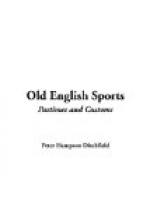[Illustration: TWO INDIVIDUALS PLAYING CHESS AS TWO OTHERS LOOK ON.]
Erasmus, the learned Dutchman, in his Colloquies suggests some curious awards for victors. He represents two youths, Adolphus and Bernard, who begin to play a game at bowls. Adolphus says, “What shall he that beats get, or he that is beaten lose?” Bernard replies, “What if he that beats shall have a piece of his ear cut off? It is a mean thing to play for money: you are a German, and I a Frenchman: we will both play for the honour of his country. If I shall beat you, you shall cry out thrice, ‘Let France flourish!’ if I shall be beat (which I hope I shall not), I will in the same words celebrate your Germany.” They bowl away: a stone represents the Jack: a mischievous bit of brickbat rather interferes with the German’s accuracy, of aim, but in the end he wins, and the French cock has to crow thrice, “Let Germany flourish.” In another game between two students who are contending in the play of striking a ball through an iron ring, it is arranged that he that is beat shall make and repeat extempore some verses in praise of him that beat him. This certainly would make many a youth keen to win the contest!
CHAPTER XII.
DECEMBER.
“The Darling of the world is come,
And fit it is we find a room
To welcome Him. The nobler part
Of all the house here is the heart,
“Which we will give Him; and bequeath
This holly and this ivy wreath
To do Him honour, who’s our King,
And Lord of all this revelling.”
HERRICK, A Christmas Carol.
St. Nicholas Day—The Boy Bishop—Christmas Eve—Christmas Customs—Mummers—“Lord of Misrule”—Conclusion.
Now dark and chill December has arrived; and very dark and chill it must have seemed to our ancestors. No gaslights illuminated the streets, here and there a feeble oil lamp helped to make the darkness visible, when the oil was not frozen: the roads were deep with mud, and everything outside was cold and cheerless. But within the farmer’s kitchen the huge logs burned brightly, and the Christmas holidays were at hand with the accustomed merrymakings, to cheer the hearts of all in the depths of the dreary winter.
But before Christmas Day arrived, the children enjoyed a great treat on St. Nicholas’ Day, December 6th, when it was the custom for parents to convey secretly presents of various kinds to their little sons and daughters, who were taught to believe that they owed them to the kindness of St. Nicholas, who, going up and down among the towns and villages, came in at the windows and distributed the gifts. St. Nicholas, who died A.D. 343, threw a purse filled with money into the bedroom of a poor man for the benefit of his three daughters, who were in sore trouble; and this story seems to have originated the custom which has been observed in many countries, and brought much enjoyment to the young folk who received St. Nicholas’ bounty.




